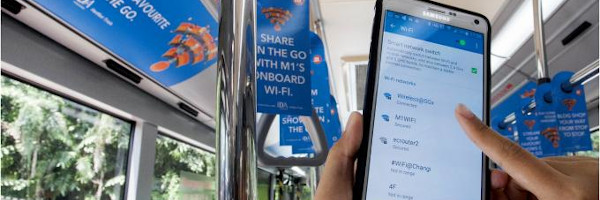Deployment of user-friendly, secure and sustainable federated public Wi-Fi systems
| Deployment of user-friendly, secure and sustainable federated public Wi-Fi systems | |
|---|---|

| |
 Singapore free wIfI | |
| Team Organizations | M1 Limited MyRepublic Limited Singapore Telecommunications Ltd StarHub Ltd Y5ZONE Singapore Pte Ltd ANTlabs Pte Ltd RansNet Singapore Pte Ltd Sigma.3 Pte Ltd |
| Team Leaders | Khoong Hock Yun |
| Participating Municipalities | Singapore |
| Status | Ready for Public Announcement |
| Document | None |
Description
To deploy a sustainable federated public Wi-Fi solution across Singapore that is has easy to use secure authenticated access and jointly develop a set of best practices with cities, industry players, and the academia to promote coordinated public Wi-Fi deployment, to address signal interference issues, standardizing user experience and security.
Challenges
Sustainability, public expectations, privacy and security are the main challenges faced by most cities.
Solutions
The proposed project shall jointly develop a set of best practices so as to standardized user experience globally.
Major Requirements
- To enhance Singapore’s federated public Wi-Fi solution with an easier to use secure authentication solution.
- To work with industry associations (i.e. Wireless Broadband Alliance) to develop best practices for interoperating secure authentication federated Wi-Fi solutions across cities.
- To share experiences of each city’s deployment
- Study the technical design of some cities deployment strategy
- Study the various financial models to sustain the deployment
- Explore more use cases for public Wi-Fi (beyond internet surfing needs)
Performance Targets
| Key Performance Indicators (KPIs) | Measurement Methods |
|---|---|
|
|
Standards, Replicability, Scalability, and Sustainability
- Employs IEEE802.1x authentication standards
- Establish interoperability with cities
Cybersecurity and Privacy
- By employing IEEE802.1x authentication standards (i.e. EAP-SIM, EAP-PEAP), users’ data over the wireless channels will be encrypted and secure.
- Users setting up for EAP-SIM/ EAP-PEAP are required to download a client app to setup their devices. The client apps are integrated directly to the service providers’ API servers. All apps go through source code review by independent security auditor before these are released.
- IMDA, as the programme owner, conducts biennial mandatory security audits (through appointed independent security auditor) on top of service providers own annual security review to ensure the Wi-Fi infrastructure continues to be secure by design.
Impacts
- Promoting secure public Wi-Fi deployment through best practices
- Bridging the digital divide
- Improving quality of lives
Demonstration/Deployment
Infocomm Media Development Authority of Singapore (IMDA) launched the Wireless@SG programme in 2006 to catalyze the deployment of secure public Wi-Fi. The programme adopted a federated model where the IMDA appoints a number of service providers to operate the public Wi-Fi hotspots, all subscribing to common login, security standards with local roaming. This allows users to access all Wireless@SG hotspots across Singapore in a seamless and secure manner using a single account. Through this, service providers are able to market and deliver commercial off the shelf service that can be procure by enterprises hence making Wireless@SG sustainable. There is also work to develop best practices and interoperability requirements between Wireless@SG and other global cities.